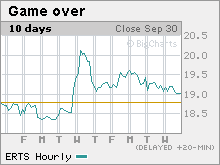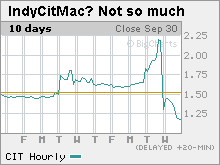The dark side of merger talk
Investors need to be wary of getting burned by unsubstantiated takeover chatter.

 |
| Shares of Electronic Arts surged on rumors that Microsoft was looking to buy it. But the stock fell once Microsoft denied the reports. |
 |
| Some traders erroneously thought that small business lender CIT Group found a savior. But the speculation that failed bank IndyMac was buying CIT turned out to be false, casuing CIT to sink. |
NEW YORK (CNNMoney.com) -- Psst. Did you hear who Microsoft is going to buy next? No? Me neither. But that hasn't stopped traders from gossiping.
Mergers are starting to make a comeback as the economy and stock market show signs of life. But there is a dark side to the pickup in deals. Takeover rumors with little to no basis in fact have also returned.
Last week, for example, Wall Street and Silicon Valley were awash with the rumor that Microsoft (MSFT, Fortune 500) was in talks to buy video game publisher Electronic Arts (ERTS). Shares of EA spiked as much as 9.6% on the chatter.
A deal for EA wouldn't have been preposterous. Microsoft, after all, has a big interest in gaming with its Xbox franchise, and EA has been frequently cited as a potential acquisition target in the past few years.
But the takeover talk turned out to be just that: talk. Microsoft spokespeople and executives quickly denied the rumors and EA's stock took a hit as a result.
The Microsoft-EA "takeover" is just one example of investors getting their hopes up only to have them dashed.
Earlier this week, The New York Post reported that hedge fund wunderkind John Paulson, who made gobs of money last year shorting financial stocks and is now sifting through the rubble for bargains, was pushing to merge troubled small business lender CIT Group (CIT, Fortune 500) with OneWestBank, the failed mortgage lender previously known as IndyMac. Paulson's firm is an investor in CIT's debt and was part of a group that bought IndyMac from the FDIC this year.
Shares of CIT unsurprisingly shot up on the "news." But this chatter also turned out to be untrue. Reuters later reported from an unnamed source that talk of an IndyMac-CIT merger was "just wrong."
CIT's stock promptly sunk, plunging 45% Wednesday. It now appears that the company is considering a prepackaged bankruptcy. Ouch.
But neither of those bogus M&A stories can hold a candle to the curious case of big screen move theater operator IMAX.
On Wednesday morning, a press release began to float around the Internet saying that IMAX (IMAX) had agreed to be purchased by Walt Disney (DIS, Fortune 500) for $1.5 billion, a handsome premium.
IMAX's stock rose more than 7% Tuesday and was up about 6% in pre-market trading Wednesday. So it seems that some investors believed the reports. But upon further inspection, there were some things that didn't make sense.
While Disney does have an agreement with IMAX where several Disney films will be shown in IMAX theaters, an outright purchase of the company would not really fit Disney's strategy. Plus, Disney just announced a few weeks ago that it was spending $4 billion to buy comic book publisher Marvel Entertainment.
Well guess what? The IMAX press release turned out to be a fake -- and a bad one at that. It was a classic cut and paste job, with mentions of the Marvel deal scattered throughout.
Still, IMAX felt compelled to issue its own legitimate press release shortly after the market opened Wednesday to point out that it had not been acquired and was not in discussions to be bought by Disney. IMAX's stock was flat Wednesday but fell nearly 2% Thursday morning.
And pranksters struck again later Thursday. Shares of Local.com (LOCM), a relatively small fish in the world of online search, shot up 8% Thursday, with most of the gains coming in the last hour and a half of trading.
Apparently, the reason for the stock's surge was a press release saying that the company had been acquired by Microsoft. Local.com put out a real press release Thursday night to say that this was not true. The stock fell more than 5% Friday morning.
Of course, not every fake merger will be a case of someone acting fraudulently and making something up out of thin air as was the case with the IMAX and Local.com rumors.
Is it possible that Microsoft and EA held talks about a deal at some point? Sure. But that's not the same thing as having a signed merger agreement that's going to be imminently announced. Just look at all the hullabaloo Thursday about Comcast and NBC Universal.
According to a story that surfaced Wednesday evening on TheWrap, a Web site focusing on the entertainment business, Comcast is in advanced discussions to purchase NBC Universal from General Electric for $35 billion.
Considering that the cable giant made a bold, unsolicited $54 billion takeover for Disney back in 2004, it's not entirely shocking that Comcast would be interested in NBC Universal.
But a Comcast spokeswoman denied this later Wednesday night, saying that "the report that Comcast has a deal to purchase NBC Universal is inaccurate."
Other reports suggest that Comcast (CMCSA, Fortune 500) is trying to purchase a stake in NBC Universal, not the whole thing. And the Comcast spokeswoman simply said that Comcast does not have a deal to purchase NBC Universal. So there probably is something to the notion that Comcast and GE (GE, Fortune 500) are talking. It just doesn't seem as if Comcast is about to ink a deal to buy all of NBC Universal.
There will probably be many more stories and rumors of takeovers that are at best slightly off the mark, and at worst just flat-out wrong. It comes with the territory now that companies are showing a willingness to make deals again.
It just goes to show that investors need to be wary of believing everything they read and hear, lest they get burned.
Talkback: Should Comcast buy NBC? Share your comments below.
We want to hear about the most outrageous consumer rip offs and unbelievable price gouging that you've come across. E-mail your story to julianne.pepitone@turner.com and you could be part of an upcoming article. For the CNNMoney.com Comment Policy, click here. ![]()

